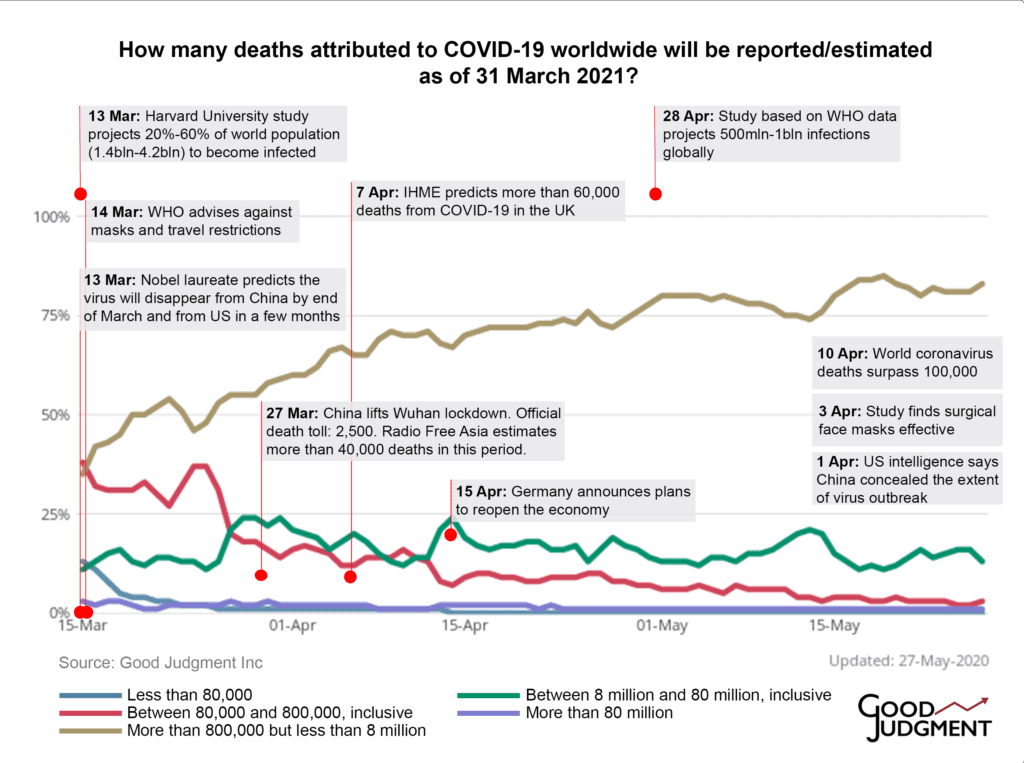With SPACs all the rage, it’s important not to be too carried away by the rhetoric. Overconfidence can be expensive. This is true in geopolitics, public health, or the stock market. From the 1961 Bay of Pigs debacle to the slow response to the COVID-19 crisis, to millions of dollars lost speculating in the markets, history is filled with costly examples. And yet, bold statements continue to be overvalued in our culture. Time and time again, the media turn to pundits who speak with conviction despite their spotty track records when it comes to offering real foresight.
 Think back to a year ago, when the airwaves were filled with experts and politicians confidently asserting that COVID-19 would swiftly pass. The US president claimed in February 2020 that the coronavirus was under control in the US and would disappear “like a miracle.” It took another month for the administration to acknowledge that the unfolding pandemic was serious.
Think back to a year ago, when the airwaves were filled with experts and politicians confidently asserting that COVID-19 would swiftly pass. The US president claimed in February 2020 that the coronavirus was under control in the US and would disappear “like a miracle.” It took another month for the administration to acknowledge that the unfolding pandemic was serious.
“A confident yes or no is satisfying in a way that maybe never is, a fact that helps to explain why the media so often turn to hedgehogs who are sure they know what is coming no matter how bad their forecasting records may be,” writes Good Judgment’s co-founder Philip E. Tetlock in his book with Dan Gardner, Superforecasting: The Art and Science of Prediction.
Dr. Tetlock refers to a distinction between “foxes” and “hedgehogs,” a metaphor borrowed from ancient Greek poetry and popularized by the philosopher Isaiah Berlin: “The fox knows many things but the hedgehog knows one big thing.”


For instance, last year Good Judgment’s Superforecasters were estimating with a 67% probability that worldwide cases of COVID-19 would exceed 53 million within a year and a 99% probability that deaths in the US alone would be more than 200,000—a figure many found exorbitant at the time. Superforecasters proved right in both cases. Their judgment was, and continues to be, well-calibrated. In other words, they know what they know and know what they don’t know, and they make their forecasts accordingly.
To avoid overconfidence, Superforecasters consider worst-case scenarios. Instead of relying on hunches and past success, they actively seek out evidence that those hunches may be wrong. They embrace new information and are not afraid to change their mind in light of new evidence.
Alas, pundits and most of the media have yet to join the foxes. “We live in a world that rewards those who speak with conviction—even when that is misplaced—and gives very little airtime to those who acknowledge doubt,” writes Financial Times columnist Jemima Kelly.
The sense of security that comes with confident judgments is comforting. But it is an illusion.
The cost of that illusion can be steep: from the inadequate early response to the pandemic to the investors trading to their detriment because they are overconfident about their ability to predict stock market returns.
Superforecasters know a way to avoid that cost: In a world that overvalues hedgehogs, pay more attention to your inner fox.
* This article originally appeared in Luckbox Magazine and is shared with their permission.
Schedule a consultation to learn how our FutureFirst monitoring tool, custom Superforecasts, and training services can help your organization make better decisions.